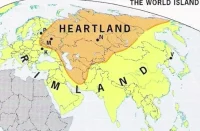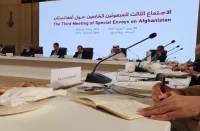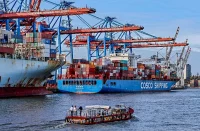In January 18, 2010, Viktor Ivanov, Chairman of the State Anti-Drug Committee and Director of Russia’s Federal Drug Control Service (FSKN), along with European Parliament member Pino Arlacchi, held a press conference at the press center of the All-Russian Television and Radio Broadcasting Company. They talked about the fight against drug production. Where? Basically, in Afghanistan.
It seems that Europe, which is spiraling out of Anglo-Saxon control, does not just want to stop sending its soldiers to Afghanistan. Now, Europeans also want Afghanistan to stop “sending” them narcotics.
“In his speech, Viktor Ivanov said that his meeting with the leading world expert on organized crime and drug trafficking is a routine step in establishing a broad international anti-drug coalition.
“Pino Arlacchi is currently crafting a new Afghanistan strategy for the European Union on behalf of the European Parliament. After it is approved by the European Parliament, the Strategy will determine the European Union’s official policy toward Afghanistan.
“It seems, said Ivanov, that the experience gained in the late 1990s, when drug production in Afghanistan had been almost completely eliminated, is little used today: eight years after the beginning of Operation Enduring Freedom Afghanistan produces 92% of the world’s opium. Meanwhile, humanity does not understand or realize what has happened in Afghanistan over the last eight years. Heroin production during that time has increased 40-fold—double the entire world production 10 years ago. Viktor Ivanov stressed that when it comes to Afghan drug production we are dealing with a planetary phenomenon, a global problem.
“The director of the Federal Drug Control Service expressed disappointment that NATO has not solved the problems of drug eradication and, it seems, does not plan to eradicate them. NATO’s recommendations to transfer the authority to eradicate drug crops to the provincial level simply look cynical.
“…In repeated statements over the past year, special US envoy for Afghanistan and Pakistan Richard Holbrooke, in acknowledging the failure of the West’s opium poppy eradication policy, announced the abandonment of crop eradication and explained it by saying that eradication of opium poppy is not only wasteful and inefficient, but it is also counterproductive as it puts Afghan farmers out of work and drives them into the arms of the Taliban.”
Here, you have to admire the idyll of “peaceful coexistence” between narcotics and the soldiers of the US Army. Miracles do not happen. If a superpower wants to do something, it will do it. But what if it does not want to do something? Then it will do nothing. Or it will do the direct opposite.
Viktor Ivanov pointed out that in Afghanistan the highest concentration of NATO forces in the world outside the Euro-Atlantic region peacefully coexists with the vast opium poppy plantations. It not only calls into question NATO counterterrorist mission but also lets us talk about the catastrophic humanitarian consequences of the Coalition’s more than eight-year presence in Afghanistan. In speaking about the effectiveness of crop eradication, Ivanov emphasized that a comparison should be drawn with the way the problem has been dealt with in Latin America.
“Aerial spraying of special defoliants by the United States in Colombia has had a tremendous impact—in 2008 229,138 hectares of drug crops were eradicated—75% of all coca plantings in the country. By way of comparison, during a similar period in Afghanistan a little more than 3% of the opium plantings were destroyed, primarily using a mechanical method.”
European Parliament member Pino Arlacchi was more restrained in his assessments. Which is understandable. He stressed that “Europe and the United States underestimate the level of the Afghan drug threat.”
“Recent years have demonstrated the ineffectiveness of NATO’s methods; urgent reallocation of the funds that have been allocated is necessary. And the money must be directed not only to combat drug traffickers, but also to develop agriculture and create new jobs in Afghanistan. In legal businesses. ‘When we speak of the eradication of narcotics we also need to remember about other approaches—fighting corruption and creating jobs. The European Union alone spends one billion euros annually on Afghanistan, and it would be sufficient if only one third of these funds went to develop agriculture in the country.’”
Arlacchi also said, “Actually, the war being waged by the United States in Afghanistan can benefit only the United States itself, because the heroin is not going to the United States; on the other hand, the Americans have been able to feed their military industrial complex while justifying the war to their people as a fight against international terrorism.”














USA do not warry about heroin. Where is afghan heroin and where is US territory? But we all know famous russian proverb – History repeats itself. Try to remember opium war between UK and China in 19th century. Not make any parallel,but 90 per cent of afghan heroin used in Russia.
Absolutely! The modern narco-Afghanistan is as precious piece of American Empire as India used to be for British in the XIX. The main value of India was exactly the producer of opium for China…. Origin of Opium Wars was the full blockade of British exports to China by Chinese authorities. Are your sure Russia is about to take such tough measures?
As an historian I should update your knowledge in Russian sayings: it was Gegel (almost, but not Russian) who said that the history repeats twice: first as tragedy and then as farce :)) Cheers,
May be Russian authorities have had enough comprehension that easiest way to reduce heroin is to stop railway connections with Tajikistan? Or create law about death penalty to drug dealers?
Perhaps :) But that would not cause ‘Poppy-war’, IMHO.
Pingback: Kyrgyzstan Destined To Become Another Narco-State? | Oriental Review
Pingback: Kyrgyzstan Destined To Become Another Narco-State? : Infowars Ireland
My cousin recommended this blog and she was totally right keep up the fantastic work!
great post as usual!
This is the best post I read as of today. Where did you got all the information from? This is very informative and very education. I will stay awhile in here. Worth reading every words!Thumbs up!
The Afghan Government is corrupt and inefficient Afghan Officials such as Karzia’s brother who have alleged links to the CIA deal in opium it makes me think maybe the CIA is doing what they did in the 70’s and 80’s in South America they sold and transported drugs to finance their private wars [nicaraguan contra scandal, etc] just a plausible scenario
I only understand that reading some wonderfully planned and influential discussions here, both for and alongside, I believe most likely its a pointer for just a broader controversy around the concern.
Really informative and fantastic complex body part of content , now that’s user genial (:.